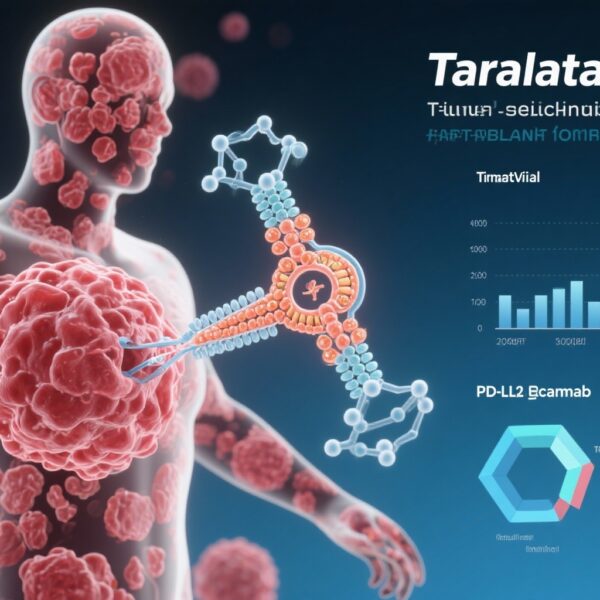Highlight
This phase 2 single-arm trial evaluated metastasis-directed radiotherapy without systemic therapy in patients with oligometastatic clear-cell renal-cell carcinoma (ccRCC). Key findings include a median systemic therapy-free survival of 34.0 months exceeding the prespecified success threshold, a median progression-free survival of 17.7 months, and a favorable safety profile with only 7% experiencing grade 3-4 adverse events. These results support the use of local ablative treatment alone in select oligometastatic ccRCC patients.
Study Background
Clear-cell renal-cell carcinoma (ccRCC) represents the predominant histologic subtype of renal-cell carcinoma and often presents or progresses to metastatic disease, which historically has had poor prognosis. Systemic therapies, including targeted agents and immune checkpoint inhibitors, have improved outcomes but carry potential toxicities and can impact quality of life. A subset of patients with limited metastatic burden—termed oligometastatic disease—may benefit from local therapies directed specifically at metastatic sites. This approach could potentially delay or even obviate the need for immediate systemic treatment, thus postponing associated side effects and preserving quality of life.
Despite this biological rationale, there is limited prospective evidence evaluating the efficacy of metastasis-directed therapies, such as radiotherapy, without concurrent systemic therapy in oligometastatic ccRCC. This gap prompted the current investigator-initiated phase 2 trial to investigate whether local ablative treatments alone can provide meaningful clinical benefit, as measured by progression-free survival and time to systemic therapy initiation.
Study Design
This was a single-center, single-arm phase 2 trial enrolling adult patients (≥18 years) with Eastern Cooperative Oncology Group (ECOG) performance status 0 to 2, histologically confirmed ccRCC, and one to five metastatic lesions. Patients were planned to undergo metastasis-directed radiotherapy to all known metastatic disease sites without receiving systemic therapy initially. Additional radiotherapy was permitted for limited progression. Patients were closely monitored using RECIST version 1.1 criteria, with co-primary endpoints defined as progression-free survival (PFS) in the per-protocol population and systemic therapy-free survival (STFS) in the intention-to-treat population.
PFS was defined as the interval from enrollment to the first documented disease progression by RECIST 1.1, radiological or clinical progression, or death. STFS was the time from enrollment to initiation of systemic therapy or death attributed to ccRCC. A prespecified 24-month median systemic therapy-free survival threshold was set as the criteria for trial success. Safety analysis included all patients who received at least one round of definitive radiotherapy.
Key Findings
Between July 13, 2018, and May 2, 2023, a total of 121 patients were enrolled and comprised the intention-to-treat population. One hundred twenty patients received at least one session of metastasis-directed radiotherapy and constituted the per-protocol and safety analyses populations. The median follow-up duration was 36.3 months (interquartile range 26.5–51.1 months), providing robust long-term outcome data.
Progression-Free Survival
The median progression-free survival was 17.7 months (95% confidence interval [CI] 14.9–22.4 months), indicating a meaningful period during which disease progression was controlled by local therapy alone. This duration is clinically relevant in metastatic ccRCC, where disease often progresses rapidly.
Systemic Therapy-Free Survival
Importantly, the median systemic therapy-free survival was 34.0 months (95% CI 28.3–54.1 months), surpassing the prespecified success criterion of 24 months. The persistence of systemic therapy-free status extends patients’ time off systemic treatment, potentially reducing toxicity and improving quality of life. The lower bound of the 95% CI exceeding 24 months underscores the statistical robustness of this finding.
Safety Profile
The treatment was generally well tolerated. Grade 3 to 4 adverse events possibly attributable to radiotherapy occurred in only 7% of patients. The most common grade 3 toxicity was localized pain near the radiotherapy site (four patients), and a single grade 4 adverse event was reported as hyperglycaemia. No treatment-related deaths were observed.
Expert Commentary
This study provides high-quality prospective evidence supporting metastasis-directed radiotherapy without systemic therapy in carefully selected patients with oligometastatic ccRCC. The survival outcomes suggest that local ablative therapy can effectively control disease and delay systemic treatment initiation for nearly three years on average. This approach aligns with growing interest in personalized oncology that tailors treatment intensity to disease burden and patient preference.
However, several caveats warrant discussion. The single-arm design lacks a randomized control group, limiting direct comparative conclusions to standard systemic therapy strategies. The trial was conducted at a single center with rigorous patient selection, which may not be generalizable to all clinical settings. Additionally, longer follow-up is desirable to characterize overall survival and late toxicities fully. Future randomized trials and biomarker-driven patient selection could optimize outcomes further.
Conclusion
In summary, this phase 2 trial demonstrates that metastasis-directed radiotherapy alone can offer a durable progression-free interval and prolonged systemic therapy-free survival in patients with oligometastatic ccRCC, with a favorable safety profile. These findings support consideration of local ablative treatment strategies as a management option in highly selected patients, enabling longer periods without systemic therapy and its attendant toxicities. Ongoing research should continue to refine patient selection and define the optimal integration of local and systemic therapies in metastatic kidney cancer care.
Funding and ClinicalTrials.gov
This study was funded by the Cancer Prevention and Research Institute of Texas, the US National Cancer Institute, and Myriad Genetics. The trial is registered at ClinicalTrials.gov under identifier NCT03575611.
References
Tang C, Sherry AD, Seo A, et al. Metastasis-directed radiotherapy without systemic therapy for oligometastatic clear-cell renal-cell carcinoma: primary efficacy analysis of a single-arm, single-centre, phase 2 trial. Lancet Oncol. 2025 Oct;26(10):1289-1299. doi:10.1016/S1470-2045(25)00380-8. Epub 2025 Sep 4. PMID: 40915303.


